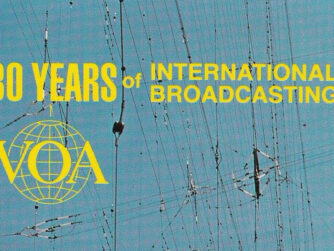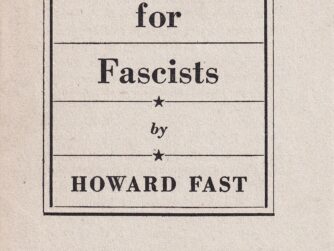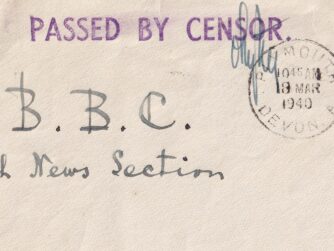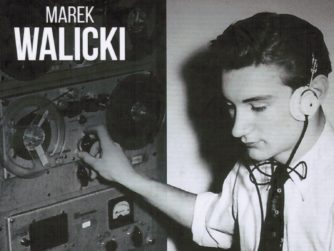Incompetence Rather Than Subversion
Barmine testified before Senator Hickenlooper’s subcommittee on May 13, 1953. In the Senate Subcommittee on Foreign Relations hearings, which were businesslike and separate from the McCarthy subcommittee’s hearings, Senator Hickenlooper noted the lack of audience for the Voice of America English-language broadcasts and various management and program delivery deficiencies. The lawmaker who would later become the leading Republican on the Senate Foreign Relations Committee also noted improvements in the content of VOA broadcasts in foreign languages to countries behind the Iron Curtain.1 But Senator Hickenlooper also discovered on his travels abroad at the end of 1952 that, contrary to the assertions of Voice of America officials, there was no vast audience abroad for VOA English-language programs, especially in countries that already had some free media. He described his findings while questioning VOA managers on April 20, 1953, before Barmine’s testimony about VOA programs to Soviet Russia.2
Senator Hickenlooper and McCarthy’s investigations focused on problems in constructing VOA short-wave radio transmitting sites. Both subcommittees came separately to the same conclusion that there had been gross incompetence and waste in implementing the project. Senator McCarthy and some other committee members alleged that “mere incompetence could not explain away all this waste.” But, as correctly noted by Edward Carleton Hedwick, Jr. in Policy Problems in the Voice of America – 1945-1953, the McCarthy hearings “failed to substantiate these charges.” They did expose, however, incompetence on the part of some VOA engineers in charge of the project.3
Two years earlier, Congressman John V. Beamer (R-IN), speaking on the floor of the House of Representatives on July 24, 1951, said that the Voice of America was “about as hard-hitting as a creampuff.” He also revealed that VOA had practically no audience in pre-Castro Cuba, where free media existed before the 1952 coup led by General Fulgencio Batista.4

Barmine supportive deputy, Alexander Frenkely, recalled that “under Barmine’s influence, there was some sharpening of the output.” He described Barmine as having “a politically extremely astute mind” and “entirely anti-Soviet.” But, according to Frenkely, “he did not let this influence his editorial or executive ability, except in matters of discussing policy, trying to influence policy. If policy was determined, and we were given some central material to carry, he would be the first to make sure that we did, if he approved of it. If he did not, he would go back to the authorities and fight it out.” 5
NOTES:
- Curator, “Senator Hickenlooper Questions Voice of America Audience Claims For VOA English Broadcasts, Notes Improvement Of News To Soviet Block – Cold War Radio Museum,” accessed October 31, 2022, http://www.coldwarradiomuseum.com/timeline/senator-hickenlooper-questions-voice-of-america-audience-claims-for-voa-english-broadcasts-notes-improvement-of-news-to-soviet-block/.
- United States. Congress. Senate. Committee on Foreign Relations. Subcommittee Under S. Res. 74 on Overseas Information Programs of the U.S. Overseas Information Programs of the U.S.: Hearings Before the United States Senate Committee On Foreign Relations, Subcommittee Under S. Res. 74 On Overseas Information Programs of the U.S., Eighty-Second Congress, Second Session. Washington: U.S. G.P.O., 1952, p. 1474. https://hdl.handle.net/2027/umn.31951d02094637q?urlappend=%3Bseq=1498.
- Edward Carleton Helwick, Jr., Policy Problems of the Voice of America: 1945-1953. Master Thesis, Department of Political Sciences, University of Southern California, June 1954. 76. Also, see United States. Congress. Senate. Committee on Government Operations. (1953). State Department Information Program –Voice of America: Hearings before the Permanent Subcommittee on Investigations of the Committee on Government Operations, United States Senate, Eighty-third Congress, first session, pursuant to S. Res. 40, a resolution authorizing the Committee on Government Operations to employ temporary additional personnel and increasing the limit of expenditures. Washington: U.S. Govt. Print. Off.., Part I, p. 8. https://hdl.handle.net/2027/hvd.32044059332916?urlappend=%3Bseq=19.
- Curator, “Voice of America Had No Audience in Pre-Castro Cuba and Initially Supported Soviet Socialism in Eastern Europe – Cold War Radio Museum,” accessed November 1, 2022, http://www.coldwarradiomuseum.com/voice-of-america-had-no-audience-in-pre-castro-cuba-did-poorly-in-exposing-failures-of-soviet-socialism/.
- The Association for Diplomatic Studies and Training Foreign Affairs Oral History Project Information Series, Alexander Frenkley, Interviewed by: Cliff Groce Initial interview date: August 5, 1988, https://www.adst.org/OH%20TOCs/Frenkley,%20Alexander%20toc.pdf.








